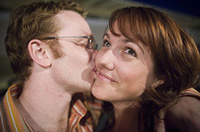ETIQUETTE AT THE OFFICE.- Culture and People. Etiquette at meetings.
Read the text and listen to the recording.

The role of the facilitator.
A facilitator is someone who helps a group of people understand their common objectives and plan to achieve them without personally taking any side of the argument. The facilitator will try to assist the group in achieving consensus. The role of a facilitator has been compared with that of a midwife who assists in the process of creation but is not the producer of the end result.
A facilitator accepts responsibility to help the group accomplish a common task: to move through the agenda in the time available and to make the necessary decisions. A facilitator makes no decisions for the group, but suggests ways to help the group move forward.
If ou want to be a successful facilitator, read the following tips:
- Start the meeting on a positive note of confidence and energy.
- Go through the whole agenda. Explain what is to be covered and how.
- Encourage the expression of various viewpoints.
- In tense situations or when solutions are hard to reach, remember that humour, affirmation, change of place, etc., may help.
- Remember that any meeting will benefit from quick breaks.
- In small meetings, it is often a good idea to evaluate the meeting to see how the process, not the content, was perceived by the participants.
- Try to end the meeting on a positive note with a sense of gathering: A song, some silence, standing in a circle, shaking hands.
Text adapted from: http://en.wikipedia.org/wiki/Facilitator
and http://www.ifuw.org/training/pdf/pdf-facil-meetings.pdf (0.03 MB)
- An opinion that everyone in a group accepts.
- A nurse who assists in the birth of a baby.
- Succeed in doing something.
- A particular way of thinking.
- A short period of time when you stop working.
- A meeting of a group of people.
If you want to find out more about meeting etiquette, visit the following website.
To test what you have learned, take the quiz.

1.- Manners are important.

Let's learn a few interesting facts about manners in the UK.
- Do stand in line: In Britain we like to form orderly queues and wait patiently for our turn, e.g. boarding a bus. It is usual to queue when required, and expected that you will take your correct turn and not push in front. 'Queue jumping' is frowned upon.
- Do say "excuse me": If someone is blocking your way and you would like them to move, say excuse me and they will move out of your way.
- Do say "please" and "thank you": It is very good manners to say "please" and "thank you". It is considered rude if you don't.
- Do cover your mouth: When yawning or coughing always cover your mouth with your hand.
- Do say "sorry": If you accidentally bump into someone, say 'sorry'. They probably will too, even if it was your fault! This is a habit and can be seen as very amusing by an 'outsider'.
- Do not greet people with a kiss: We only kiss people who are close friends and relatives. Also, avoid doing gestures such as backslapping and hugging. This is only done among close friends.
- Do not ask personal or intimate questions: We like our privacy. Please do not ask questions such as "How much money do you earn?" "How much do you weigh?" or "Why aren't you married?".
Text and activity adapted from http://www.woodlands-junior.kent.sch.uk/customs/behaviour.html
Write in the forum:
Why not make a similar list for visitors to your country?
Did you know that manners are all about a reduction of violence between people? Listen to a radio programme about manners and do the exercises.
2.- Back to December.
"An apology is the superglue of life. It can repair just about anything."
Lynn Johnston

"I'm sorry" songs are quite popular. Here is a list of some songs to tell someone you're sorry for what you've done. I'm sure you can think of some more.
- Elton John - Sorry seems to be the hardest word.
- Evanescence - Forgive me.
- Chicago - Hard to say I'm sorry.
- Elvis Presley - Always on my mind.
Read part of the song "Back to December" and answer the questions:
"So this is me swallowing my pride
Standing in front of you, saying I'm sorry for that night
And I go back to December all the time"
- What does the above verse mean?
- What do you think the song is about?
Appendix.- Licenses of resources.
| Resource (1) | Resource information (1) | Resource (2) | Resource information (2) |
|---|---|---|---|
 |
By: Richard Rutter. License: CC by 2.0. From: http://www.flickr.com/photos/clagnut/252185030/ |
 |
By: Thomas Hawk. License: CC by-nc 2.0. From: http://www.flickr.com/photos/thomashawk/245769695/ |
 |
By: °Florian. License: CC by-sa 2.0. From: http://www.flickr.com/photos/fboyd/2697110891/ |